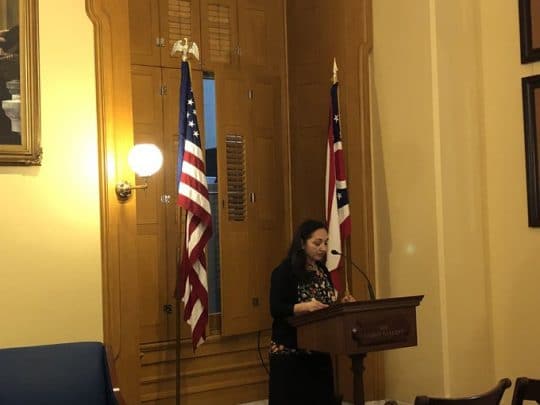 Public Statements in Opposition to H.B. 327
Public Statements in Opposition to H.B. 327
April 4, 2022
Earlier today, I had the opportunity to voice CDF-Ohio’s opposition to H.B. 327. I joined our partners, Tim Johnson from the Ohio Poverty Law Center, Charleta Tavares, and Rev. Tim Ahrens to share how this misguided legislation would impact health disparities and actually worsen them. Please see my comments below.
My name is Tracy Nájera, I’m executive director of the Children’s Defense Fund-Ohio. As an organization birthed from the civil rights movement, we work every single day to make sure that all children – especially those who are Black, Brown, low-income, and with disabilities, can thrive and flourish into successful adulthood. We accomplish this through centering community voices, being data informed, working in partnership with policy makers and state and local agencies serving children. In short – we follow the data, research, the on the ground realities of Ohioans.
I am here to discuss Ohio Substitute House Bill 327, the so called “divisive concepts bill”, which is currently pending in the House State and Local Government Committee. This legislation, which is similar to other bills that are being pushed by outside groups in service to an extreme political agenda, and Ohio is the latest state to fall prey.
The legislation itself is sweeping in nature and is nothing short of a solution to a problem that does not exist but will instead create a myriad of challenges for educators, state and local government agencies, and nonprofit organizations that receive funding from the state of Ohio – any level of funding. It simply denies history, data, research, and the reality experienced by people throughout our state.
There have been numerous discussions about how this legislation will impact education and state and local government, but less conversation about how it will affect our non-profit sector. As you know, April is minority health month and this is important because in the state of Ohio depending on where you live, the color of your skin, and other factors – your life expectancy is predictable. A Black infant born is 3 times more likely to die in their first 12 months of life than a white infant. These statistics are not isolated to babies – poor health outcomes based on race and ethnicity persist in many other health indicators – like asthma, diabetes, and the list goes on. Of course, getting to the root causes of health disparities is part of the solution and becoming aware and educated on these
factors to change our practices and our approaches are part of this process of continuous improvements at the systems level.
This legislation would essentially put a halt to state agencies, local communities, and nonprofit organizations receiving state or local grants from being able to do work to address disparities in public health. This legislation represents an overreach of state government by subjecting not just state agencies and local governments to these provisions, but any non-profit group they contract with. This means groups currently receiving grants from state and local governments would lose funding for attempting to address health disparities and state and local governments would be prohibited from giving out funding to address health disparities going forward.
The legislation would put an end to concepts that are part of a comprehensive race equity and anti-discrimination trainings – such as understanding implicit bias and oppression. Further, instead of having individuals on staff with non-profits or public agencies to address issues such as health disparities and equity, the legislation would essentially require policing of these trainings to enforce the law.
Averting our eyes from reality does nothing to help Ohioans, it will only make health outcomes and disparities worse.
Just to give an example, research has shown that implicit bias training, race equity training, and cultural competence trainings for health professionals as they matriculate through undergraduate, graduate, and professional training is critical to improving health care for all people – especially for Black, Brown, low income, and refugee communities. It’s not only critical to realize positive health outcomes for the communities we serve – let’s face it – it’s good for everyone in our communities – for community members and for business.
This legislation would hamstring the work that is being done not only in our communities and our educational institutions, but also in our teaching hospitals and public health agencies and will have a direct impact on their ability to address health disparities.
Jeopardizing the quality of our education system
Our children are living in a complex time of current events, making an accurate and full civic education If passed, this legislation would jeopardize advance placement programs (AP) and students’ ability to earn college credit for that coursework throughout the state. Understanding of who we are and how we got here more important than ever, and this legislation will have far-reaching implications for Ohio’s future. We must consider how this legislation will impact our aspiring doctors, nurses, public health professionals and leave students throughout our state ill equipped to tackle tomorrow’s challenges. At a time when we should be focused on building and investing in our talent pipeline, we are hamstringing our educators and this legislation represents a disserve to our children.
We must not repeat the mistakes of history by refusing to learn it and in this case to resist attempts to erode honesty in Ohio education.
We call on Speaker Cupp to affirm that there will no further hearings on HB 327. It’s bad policy for children, for our communities, for Ohio. Our children deserve so much better.
